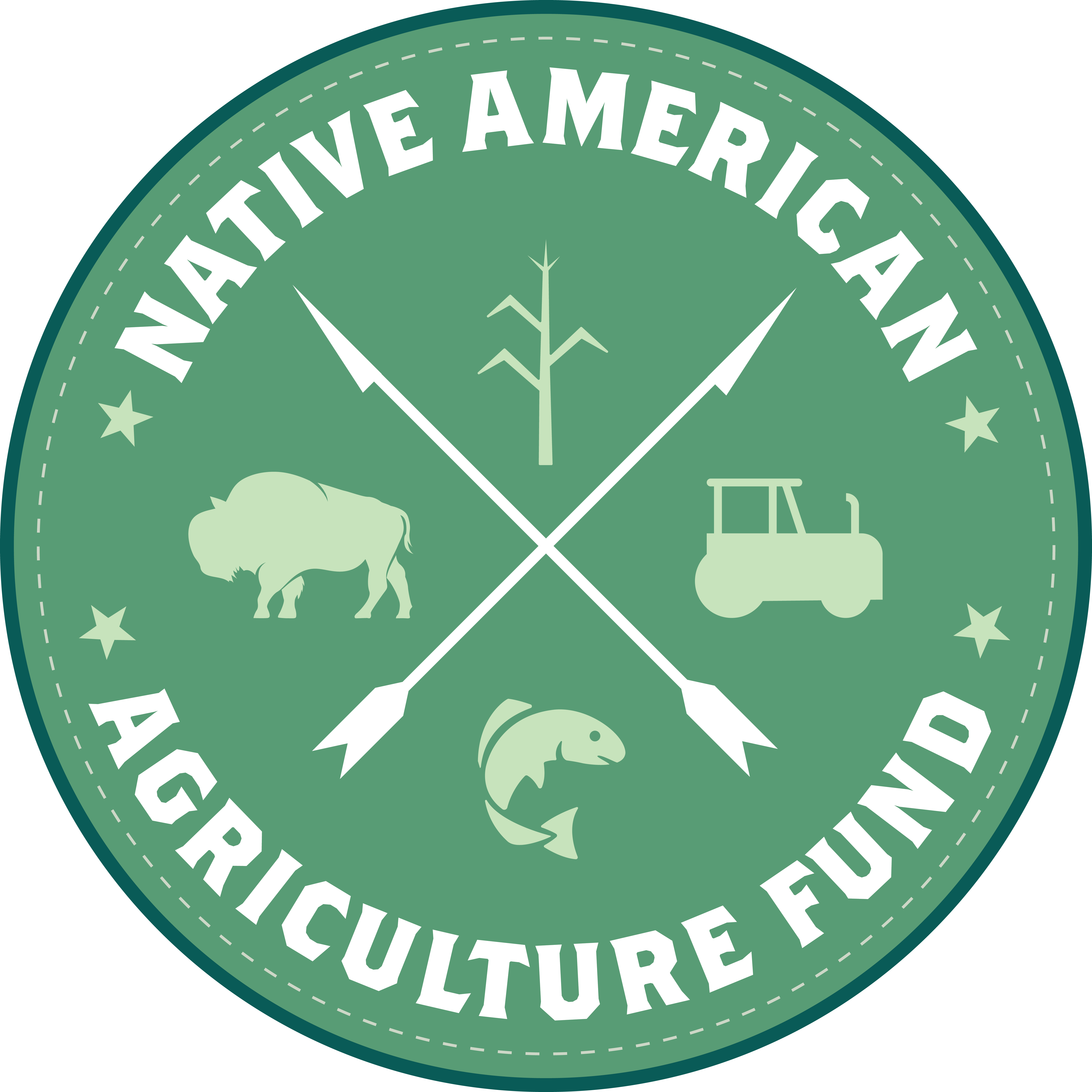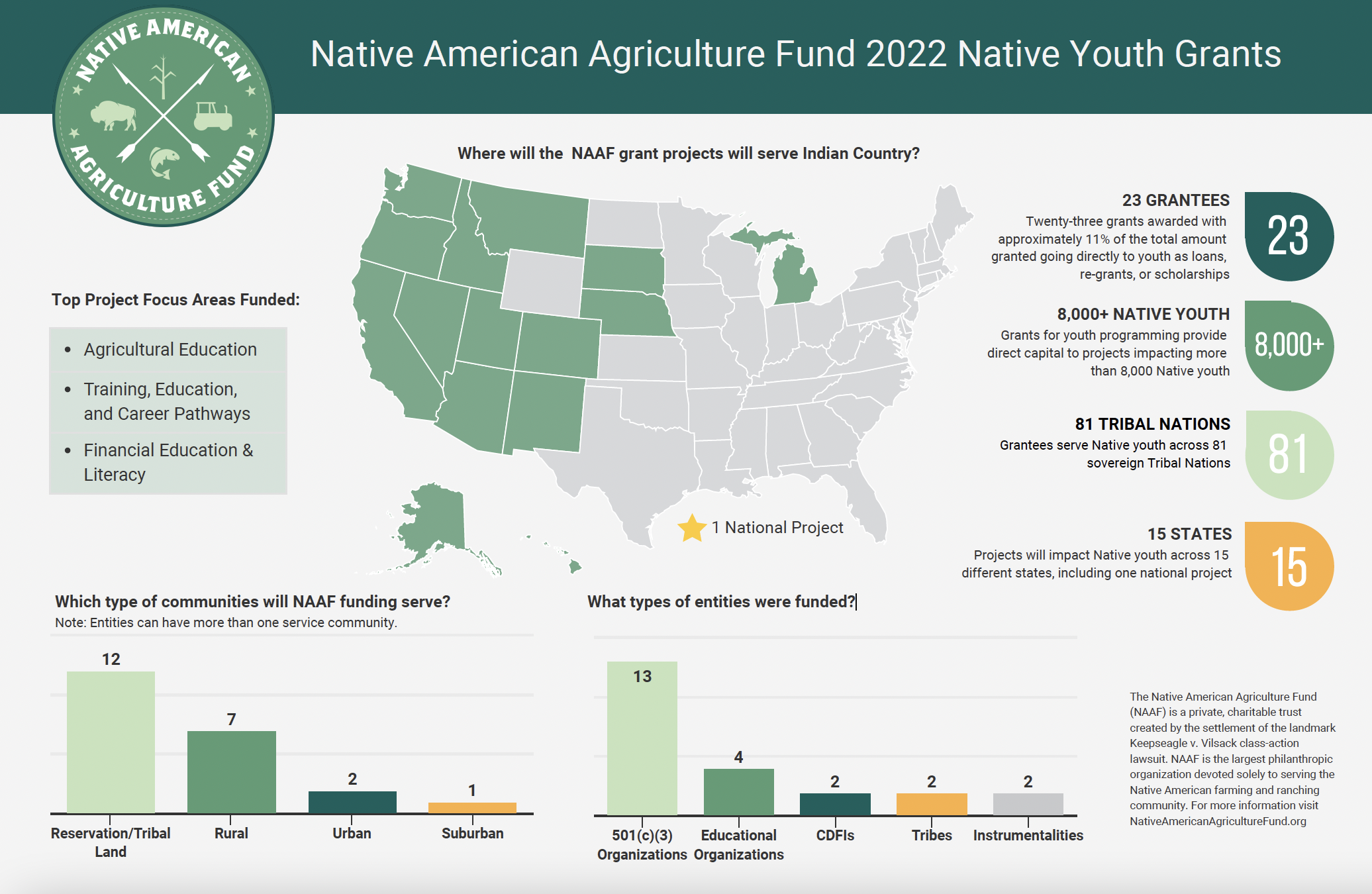2022 Native Youth Grantees
After a competitive review process, the following organizations were awarded Native youth grants during the 2022 Youth Request for Applications cycle. Learn more about this year’s investment in Native Youth.
Any questions about these 2022 Native Youth Grantees can be sent to grants@NativeAmericanAgricultureFund.org.
Akiptan, Inc.
Akiptan Inc. of South Dakota will facilitate year 2 of the Okhichanye Scholarship Program, supporting educational advancement in Native Agriculture. This project will also continue to facilitate an internship program giving opportunities for hands-on experience to Native participants.
Ancestral Lands
Acoma Traditional Farm Corps of Albuquerque New Mexico will increase educational opportunities in farming and engage the next generation of farmers. With NAAF funding this project will provide local produce to the community while creating opportunities to strengthen cultural foodways and food sovereignty.
Board of Regents, University of Nevada, Reno
The Nevada Youth Facilitating Food Sovereignty program created by the University of Nevada, Reno intends to focus their efforts on capacity building. NAAF funds will help will increase opportunities for college preparedness in the agricultural discipline as well as provide financial management guidance.
Center for Rural Affairs
Through hands-on opportunities and traditional practices, NAAF funding will assist The Center for Rural Affairs Isanti Youth Agriculture and Business Education Project in bridging the gaps between growing produce and small business opportunities.
Cheyenne River Youth Project
With NAAF funding, the Cheyenne River Youth Project (CRYP) will prepare Lakota teens aged 13-18 for a future in agriculture-related business development and food sovereignty while focusing on cultural traditions. Lakota youth will participate in projects such as gardening, indigenous farming, and activities while learning about building a business and access to capital.
Copper River Native Association
Copper River Native Association is providing a youth project titled Tribal Community Services Youth Beginning Re-Grant Program. This program will allow Alaskan Native community members educational opportunities geared towards food security, harvesting techniques, garden growth, and maintenance as well as exposure to raising farm animals.
Cowlitz Indian Tribe
The youth Native Foods Project operated by the Cowlitz tribe is intended to educate Cowlitz youth on identifying, preparing, and preserving first foods. With NAAF funding, the project allows support and assistance in the enhancement of Agriculture career opportunities.
Diné Community Development Corporation
The Diné Community Development Corp. will provide access to agricultural entrepreneurship workshops to boost emerging Navajo youth farmers’ and ranchers’ financial literacy and business knowledge. Through their Youth Agripreneurship Program along with NAAF funding this program will create space and opportunity to encourage Diné youth to build upon their own agriculture-focused businesses.
Grand Traverse Band of Ottawa and Chippewa Indians
The Grand Traverse Band Youth Horticulture and Fishing Project (YHF) plans to provide a series of classes and workshops to Tribal youth. With NAAF funding YHF will utilize classes to teach access to capital and agriculture management as well as the traditional farming and fishing practices while incorporating modern technology to Tribal youth.
Homestead Community Development Corporation
The Homestead Agricultural Youth Council-Molokai (HAYC-Molokai) will invest in the future of Native Hawaiian youth and the next generation of agriculture practitioners through a youth council to facilitate ideas and activism, financial training, policy dialogue, a hands-on seed bank, and equity fund investments in youth.
Klamath Trinity Resource Conservation District
The Hoopa Youth Livestock Project will provide Tribal youth with a structured foundation in which Tribal youth can create individual year-round businesses raising livestock and marketing their animals on the Hoopa Valley Indian Reservation and the surrounding communities.
Ma Ka Hana Ike Building Program
The Na Pulapula O Hana (Seedlings of Hana) project provides the PreK-12 Native Hawaiian youth of East Maui, Hawai’i with farming education, training, projects, and service opportunities centered around agricultural resources of traditional and modern Hawaiian cultural significance.
Methow Field Institute
www.methowvalleyinterpretivecenter.com
The Seed to Syilx–Traditional Food Systems program will build upon the existing Traditional Foods System program, established under a 2020 NAAF grant. The project will continue to develop a Native Garden and connect students with traditional foods. A new native food plant nursery will give students new business tools to help them build a more sovereign food future.
Nakoda~Aaniiih Credit Agency
Nakoda Aaniiih Credit Agency Facebook Page
The intention of the NACA-INC Youth Program is to provide youth leadership training that will develop student agricultural leadership and entrepreneurial skills. The program has the potential to create a long-term positive impact by increasing the number of Native agricultural producers on the Fort Belknap Reservation.
Native American Community Academy
The Native American Community Academy (NACA) project Food-Sovereignty Chain: Linking Indigenous Knowledge to Our Lifeways is rooted in reclaiming ancestral food systems with the branches extending into sustainable communities. The project grounds students in traditional practices in fishing, gardening, foraging, and ecological stewardship while giving them tools to chart their own pathways to commercial operations and careers in agriculture.
New Mexico State University
www.arrowheadcenter.nmsu.edu/program/aibe/
In partnership with Navajo Technical University NMSU’s Innoventure Native Youth Ag Camp (INYAC) provides Native youth the opportunity to learn how to construct cattle ranch management plans, learn about business and personal finances, and ultimately gain greater access to capital to become community producers, farmers, and ranchers.
Owens Valley Indian Water Commission
The Owens Valley Indian Water Commission (OVIWC) will conduct the Nüümü/Newe Preserving Our Future Project which will provide youth with hands-on activities in the form of workshops, field trips, training sessions, and in-the-dirt projects that will help our youth become young food producers. The OVIWC will provide 4-H/FFA scholarships to at least 20 youth that will assist them in overcoming financial barriers to participating in market animal projects.
Painted Desert Demonstration Projects – The STAR School
The STAR School will implement a STAR Livestock Club where students will raise sheep and cattle at home and participate in weekly after-school activities. The club will integrate classroom learning and PBIS, connect to the Navajo language and culture, promote independent ranching along with access to capital and develop future career pathways for students.
Sicangu Community Development Corporation
The Growing the Next Generation of Sicangu Farmers & Food Producers program is an initiative that will increase youth engagement in the Rosebud food sovereignty movement through partnerships with local schools and the 7Gen Youth Internship. The goal is to generate excitement and stoke interest in Sicangu students becoming the food producers of the future.
Takshanuk Watershed Council
With the Takshanuk Watershed Council’s Gardening Education program, Native students in the towns of Haines, Klukwan, and Mosquito Lake will learn how to grow food in Alaska’s Chilkat Valley. They will develop their skills in food production and composting while learning how to generate income from local produce.
Tanka Fund
The aim of the Tanka Landback Youth Project is to create opportunities for long-term land sustainability by utilizing sustainable methods of agriculture and herd management by incorporating Indigenous youth into our everyday processes. Through this work, the Tanka Fund’s mission to improve the lands, lives, and economies of Native communities will continue.
The Blackfeet Nation Agriculture Development Foundation
The Blackfeet Nation Youth in Agriculture Scholarship will provide scholarships to Native students who are descendants of the Blackfeet Tribe and are pursuing higher education in the agriculture sciences or related studies with the goal of increasing the number of Native farmers, ranchers, and ag professionals that can contribute to generating laws, policy, and programs that influence the discipline of agriculture.
Zuni Youth Enrichment Project
The Zuni Youth Enrichment Project (ZYEP) Rooted in Healthy Traditions: After-school Food Sovereignty Program for Zuni Youth is a 12-month after-school program that will provide 240 Zuni youth with increased opportunities to participate in Zuni’s traditional agriculture cycle of planting, maintaining, harvesting, and seed saving. Participating youth will increase their connection to Zuni culture and language as they practice Zuni food sovereignty.

